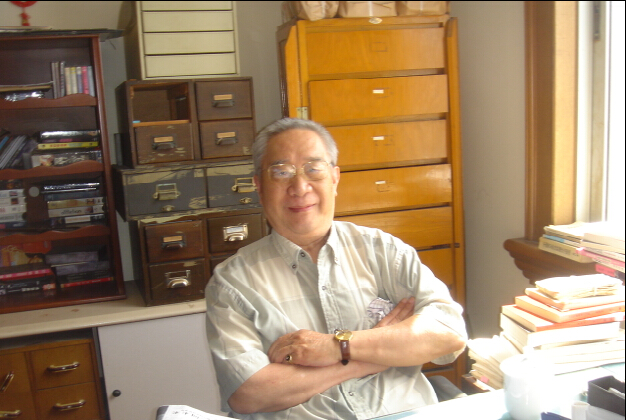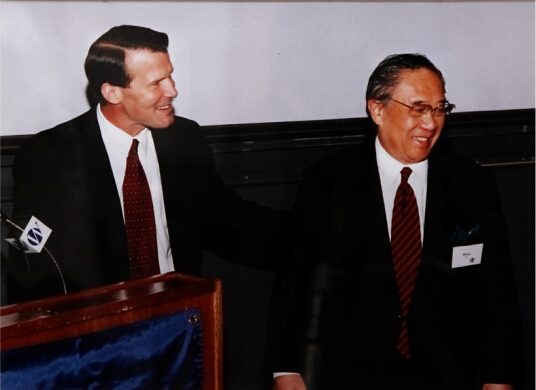Sino-U.S. relations remain on continuum of conflict, cooperation

Wang Xi

Wang Xi invited to give a speech at the Wharton School of the Unviersity of Pennsylvania
Wang Xi (1920- ), a noted Chinese historian, graduated from the Wharton School of the University of Pennsylvania in 1947. He has served as deputy director of the Center for American Studies at Fudan University and deputy president of the History of Sino-U.S. Relations Research Council. At present, he is an academic adviser of the Center for American Studies at Fudan University and an editorial board member of American Studies Quarterly.
Any discussion of the world situation and international relations is incomplete without an examination of Sino-U.S. relations. The present status of relations between China and the United States remains somewhere along the continuum of conflicts and cooperation. In 2011, the overtures that the United States made toward recalibrating its strategy in the Asia-Pacific region meant that the United States will attempt to contain China’s regional impact. However, lots of realistic issues are bound to not trigger massive conflicts between China and the United States. Recently, CSST’s reporter interviewed Wang Xi, a scholar of Sino-U.S. relations history.
CSST: With regard to the study of Sino-U.S. relations, your peers in academia have assessed that your new achievements based on international academic frontiers have made a great contribution to the advancement of studies on the history of Sino-U.S. relations and the history of international relations in general. At the beginning of the reform and opening up, you were the first to publish an article — Brief Review on Some Issues of the History of Sino-U.S. Relations — attracting the attention of academia and exerting a significant influence. Could you give a brief introduction about your studies on the history of Sino-U.S. relations?
Wang Xi: In my view, the study of Sino-U.S. relations should not only focus on China but also pay attention to the United States. It should not only find out the impact of the United States on China but also discover the influence of China on the United States, which I have talked about in Way of Seeking. We need to study the mutual influence between the two countries and the origin of the influence as well. Also, we need to find out the results of the influence.
In the past, we studied issues on how America has “invaded” us, how we resisted, why America “invaded” us, what were the results of this “invasion”, and what difference exists between America’s “invasion” and that of other countries. But generally American scholars do not think in terms of America’s “invasion” of China, and their focus is mainly on the influence of Western civilizations on modern China’s development and socioeconomic transitions.
They theorize that the pattern of China’s modernization is the result of Western culture shock. This perspective is known as John King Fairbank’s “impact-reaction” pattern. However, Fairbank’s student Paul A. Cohen has a different argument. Cohen indicated that China’s economic development is an internal affair in China and internal factors of Chinese society should be studied, which is “Sinocentrism”. With regard to these two different research approaches, there are pros and cons. I proposed that internal and external factors should be combined to avoid a one-sided study.
CSST: How can we combine the study of Sino-U.S. relations and the study of contemporary international relations together?
Wang Xi: The importance of this question has become more and more prominent. The national power of China was formerly relatively weak, but at present, China is a rising great power, and discussions on the world situation and international relations cannot neglect the study of Sino-U.S. relations.
America’s views on China are very prudent and the United States wants to understand China’s strategic intentions. Recently, Chuck Hagel, the U.S. Secretary of Defense, visited China in an attempt to find out China’s strategic intentions and at the same time, Sino-Japanese relations have become a significant consideration in Sino-U.S. relations.
CSST: At college, you majored in economics and chose history as your minor. Your later research orientation has covered both economics and history, which are completely distinguished disciplines, but you did a good job of combining them. Today, academia has realized the importance of interdisciplinary studies. As a pioneer, what do you propose to improve interdisciplinary studies on the basis of your relevant experience?
Wang Xi: Based on my own experiences, interdisciplinary studies came from practice. I studied economics at Sichuan University and then studied in the U.S. What I learned in the U.S. was relatively diverse and complicated. I learned economic theories at the University of Chicago and took courses of economic history at summer school of Cornell University. At Wharton, I studied economic history, international economics and business cycle theory.
At college, although what I learned had no direct relationship to interdisciplinary studies, my supervisor always mentioned something about interdisciplinary studies in his lectures. After each class, I always communicated with my teachers. They would ask some general questions, some of which contained interdisciplinary research approaches. But at that time, my teachers didn’t tell me that and I only gradually came to understand concepts of interdisciplinary studies. When I was a student, I didn’t have an intuition for interdisciplinary studies. It wasn’t until I began to teach that I started to realize the meaning of interdisciplinary studies step by step.
At the time, overseas students believed that their mission was to serve China and were determined to go home when they completed their education abroad. When I returned to China, teachers taught state-owned economy at college, and what I learned about bourgeois economics, including business administration and insurance, was completely useless, so I had to study economic history at Shanghai Academy of Social Sciences.
Afterward, when I taught at Fudan University, I opened many interdisciplinary courses, including international trade theory, Sino-American economic relationships and history of Sino-U.S. relations. There are many interdisciplinary details in my lecture notes, so my teaching approach has gradually affected my students and a tradition of interdisciplinary studies naturally came into being. Therefore, I never insist that the concept of interdisciplinary studies come first and then considered about interdisciplinary studies. Instead, interdisciplinary approaches are mastered without being explicitly emphasized throughout the course of the research.
CSST: You published theses in Historical Research very early, and then published several articles, i.e. On the Nature and Function of Westernization Group’s Government-Supervised and Merchant-Managed Firms, and Studies on the Orientation of Modern History of China – External Cause, Internal Cause or the Combination of Internal and External Causes. So would you please share your experience of writing papers with us?
Wang Xi: Before I came to Fudan University I wrote my first thesis. Traced back to the year 1959, I worked at Shanghai Academy of Social Sciences and I wrote this thesis in order to commemorate the 100th anniversary of the Great Rebellion in India. The thesis was published on No. 8 Issue of Historical Research in 1959. When I finished writing, I sent it to Professor Chen Hansheng, and he praised it.
On Government-Supervised and Merchant-Managed Organization in the Late Qing Dynasty has won the Shanghai Philosophy and Social Sciences Excellent Paper Award between 1979 and 1985. On this basis, I published On the Nature and Function of Westernization Group’s Government-Supervised and Merchant-Managed Firms on Historical Research in 1983. My papers are mainly published on two journals: one is Historical Research and the other is Fudan Journal. World History also published some of my papers.
CSST: What are your expectations for and what advice can you give to today’s young scholars?
Wang Xi: I hope that young scholars don’t seek something other than their profession when they conduct studies. Young scholars should bear the cold shoulder and truly concentrate on studies. If they think too much, it is impossible for young scholars to engage in scholarship. Writing academic articles should avoid empty words in order to make each word based on real facts. Certainly, I also hope that modern society could provide much more support to young scholars and make their living conditions much better.
The Chinese version appeared in Chinese Social Sciences Today, No. 638, August. 25, 2014
Translated by Zhang Mengying
The Chinese link:
http://sscp.cssn.cn/zdtj/201408/t20140825_1302315.html
